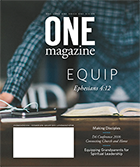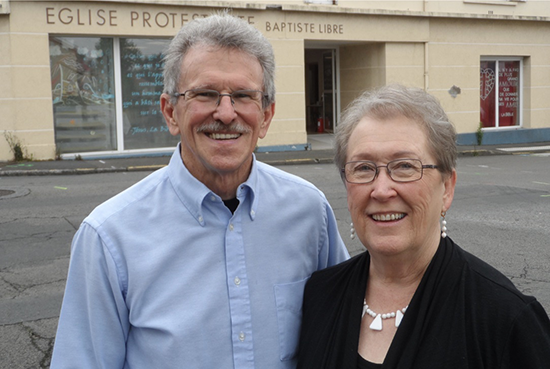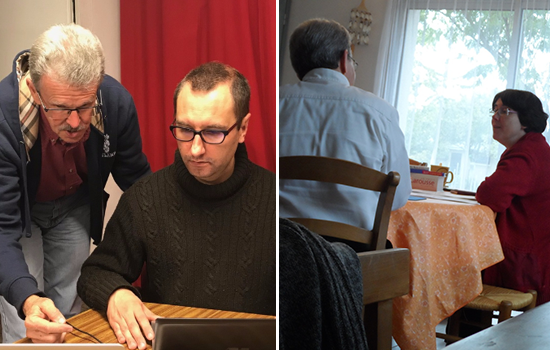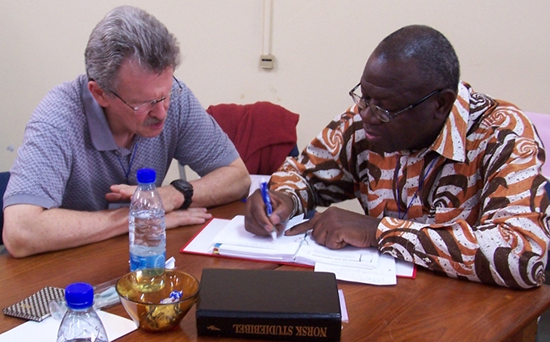
December 2018–
January 2019
Equip
(Ephesians 4:12)
------------------
|





Making Disciples
By Robert Bryan
When my wife Judy and I assumed the leadership of the Evangelical Publications Center in Abidjan, Côte d’Ivoire, in 1984, I felt we had become second-class missionaries. Yes, we sent Bible-based literature into almost every French-speaking country in Africa, but somehow that didn’t seem enough. That literature was strengthening, training, and building up Christians all over the continent. Yet, in some way, it seemed our ministry was less valuable than others. We weren’t planting churches, you see. We were no longer on the front lines.
Then the Lord reminded me we had not gone to the Ivory Coast only to plant churches. We didn’t go there simply to proclaim the gospel. We didn’t even go just to win people to Christ.
All those things are essential, but they were not why we went to Africa. We were in Côte d’Ivoire to make disciples of Jesus Christ—fully-devoted followers of our Lord.
The overarching purpose of all missionary activity is to make disciples of Christ. Preaching the gospel so people will place their faith in Christ is essential, but it’s not the end we seek. Planting churches is critical, but it’s not the goal of our efforts. They serve as ways to help us reach the goal. The end game is to make disciples.
When that truth sank in deeply, it changed my attitude towards “just” publishing Bible-based books. And it also got me thinking. If we’re to make disciples, what is involved in moving people from unbeliever to believer to disciple? What does a disciple look like? Can someone not be a disciple and still be a believer? How does a disciple act? How do they react to life events? What characterizes a disciple? And how in the world do you “make” one?
Disciples always exhibit a transformed character. Their way of living changes—not because they’re following rules laid down by their pastor or the prevailing Christian culture, but because they allow God to fundamentally change their character and their way of thinking.
Joseph* started attending the church at St. Sébastien a little over a year ago, but not because he wanted to hear the gospel. He came only because he was interested in Cathy, a believer. After several months (while Cathy and her family witnessed to him and the church prayed), he told Jonathan Chéreau he had many questions about God and faith, and he’d like to talk to someone. Jonathan and I began meeting with him. Joseph hadn’t lied. He had a lot of questions!

Using the How Can Anybody Know if There Is a God? manual, we read, “Where do you place yourself in relationship to God?” Joseph responded, “Well, two months ago I would have said atheist. Today, I believe there is a God, and that He is active in the world.” About a month later, Joseph put his faith in Christ.
Less than two weeks after his conversion, Joseph called Jonathan with another question: should he attend the rock concert he had attended for years or should he go to the JPENSE meeting? (JPENSE is an event at which non-Christians hear solid reasons faith in Christ is both intelligent and reasonable.) Wisely, Jonathan did not give him the answer. Instead, he asked Joseph some questions and pointed him to the Word.
A couple days later, Joseph called Jonathan to say he was going to JPENSE. A disciple lives differently because God has transformed his character.
Several years ago, a former French government minister said, “France has chosen to live without God.” The prevailing culture dictates religion remain a private affair, never intruding into public discussion. That’s in complete opposition to what discipleship is—a total transformation of one’s character and way of life so as to resemble and reflect Jesus Christ. In France, a disciple definitely swims against the current.

When we first arrived in France, we bought our car from the brother of Yannick Kermorvan, a believer we had known for a long time. My conversations with the brother only confirmed what I had heard: he had no interest at all in hearing about Jesus. When I brought up Yannick, his brother almost immediately responded that while he loved Yannick, “Yannick’s got to learn to leave his faith at the house when he comes to work.”
A disciple is going to live in a way people notice. He’s going to do whatever he can to bring people to Christ—even sometimes missing church.
One Sunday several months ago, Cyprien Lebacle approached me after a church service to tell me he wouldn’t be at church the following week. “I have a chance to go mountain biking with some unsaved friends,” he said, “and I want to take that chance to talk to them about the Lord.” His friends would never accept his invitation to come to church, so Cyprien was going to them.
Weak pastor that I was, instead of berating him, I gave him a high five and prayed for him. And I prayed more people in the church would miss occasionally for that reason. Bringing people to Christ is a priority for a disciple, even if it means taking the risk of going against the prevailing culture.
Exactly how do you go about making a disciple? I have come to believe we don’t so much do the making, as we prepare the terrain for God to work.
After an LMC** weekend of training and teaching on relationships, Sylvain Warmoës determined he was going to obey the Lord by encouraging and affirming his colleagues in the surgical ward where he works as a nurse. The first reactions weren’t positive. Encouragement and affirmation are uncommon in French culture. His coworkers thought he was trying to butter them up, but he didn’t let that stop him.
“It took a long time for my colleagues to understand my real intentions, but the perseverance paid off,” he told me recently. It has changed the whole atmosphere at his workplace.
Sylvain was teachable. We couldn’t make Sylvain affirm his colleagues; we could only prepare the terrain and give him the teaching. He chose to obey and left the results in God’s hands.
We follow up with each new convert, of course. We preach and teach on doctrine and apologetics. We’ve found, though, the most effective method of making disciples almost always involves personal investment in the life of the believer, spending personal time with an individual, sometimes even before they have taken the step of faith.
Matt Price spent hours with Shuang before she came to faith. She arrived from her native China to study at the University of Nantes. Other Chinese students told her about Christ. Like most of them, she was cautious and wanted to receive answers to all her questions before believing in Christ. When she finally placed her faith in Jesus, she knew what it meant, and she was all in from day one. The transformation in her life was evident. She became a courageous witness immediately.
Instant disciple? Not quite. Just a prepared convert who understood the stark differences between her Communist upbringing and the transformation in Christ, and made the commitment to follow Him.
We’ve discovered making disciples in France involves much more listening than talking, more asking questions than giving directions. It entails more explaining the logical foundations of why we believe than simply telling them what we believe. It requires helping individuals think.
It would be easier just to tell young believers what to do, rather than helping them discover what God wants them to do. It would be easier to give directions than ask questions. It would be easier to say “Do this” than ask “What do the Scriptures say?” and guiding them through their discoveries. It would be easier to push for immediate change than to wait for the Lord to transform them for permanent change. It would be easier…but it wouldn’t produce disciples of Christ.
So, we try to make every activity contribute to that goal. We teach and preach and pray and host activities and spend time with people. We ask questions. We listen. We look into the Scripture with them. We show our love. And God transforms them—and us—into disciples, fully devoted followers of Jesus Christ.
Of course, the single most important—and most difficult—element in making disciples is my own discipleship. People learn best by following an example, and their hypocrite radar works 24/7. As I teach forgiveness, do I forgive? As I encourage prayer, do I pray? As I urge generosity, am I stingy? As I tell them they can trust God, do I live in a constant state of worry? I can’t very well make disciples of Jesus unless I am one myself.
*A pseudonym
**LMC is the Leadership Matters Course that trains leaders from churches and mission agencies around the world. Robert and Judy were instrumental in putting the course into French.
About the Writer: Robert and Judy Bryan spent 50 years making disciples in Côte d’Ivoire and France. They will retire from full-time ministry with IM as of December 31, 2018. Read more: IMINC.org
|
|

